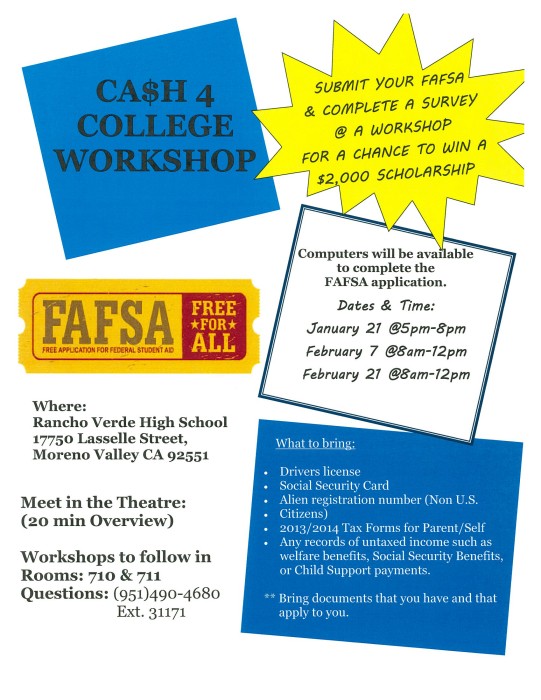Cash and the FAFSA
Post on: 16 Июль, 2015 No Comment

Today Im sharing a guest post from Kenneth OConnor, director of student advocacy at cuStudentLoans.org . which is a source for private student loans . If you end up shopping for a private student loan, the best place will almost always be at a credit union, but thats a topic for another day.
OConnor has written a post about how the Free Application for Federal Student Aid treats checking and savings account assets.
OConnors post suggest ways that parents can reduce their cash in the hopes of increasing their eligiblity for need-based aid. You should keep in mind, however, that less than 4% of families have enough non-retirement assets to shrink their eligibility for financial aid . I wrote the following post about this earlier in the month:
Reducing Your Cash Before Filing the FAFSA
Here is OConnors advice:
When completing the FAFSA . parents and students must list income and asset information. This normally includes information found on the 1040 tax return, or by consulting other important financial documents to transfer the data to the online application.
One of the questions covers the area of cash assets. Cash assets are typically hard to track or trace, so the FAFSA phrases the question as follows….
“As of today what is your parent’s total current balance of cash, savings and checking accounts?”
“As of today, what is your (student) total current balance of cash, savings and checking accounts?”
The key part of these statements is “As of today”. leaving some flexibility for the student and/or parent to answer. If indeed there were no cash available in any of these accounts on the day the FAFSA were filed the correct answer would be zero.
So logically speaking, it would behoove the applicant to have as little cash available as possible on the day the FAFSA is filed to help maximize financial aid eligibility.
5 Ways to Reduce Your Cash
Here are five ways to reduce your cash before filing the FAFSA:
1. Pay off credit cards.
If you have any credit card debt, and are carrying extra cash in your checking or savings, go ahead and make a bigger payment towards that debt just before filing the FAFSA. The FAFSA does not ask any questions about personal debt, the methodology only cares about what cash is on hand the day the FAFSA is filed. Instead of listing this cash as an available asset, it should be used to reduce personal debt. It does not make sense to be penalized by the FAFSA for having cash when one has outstanding debts to be repaid with interest.
2. Maybe it’s time to upgrade the computer/laptop/smart phone.
Let’s say personal debts are well managed, but your computer is worn out and behind on capabilities. It may be time to make an investment in technology. There are some good deals for college students looking to buy computer technology, especially online.
3. Use it for transportation or other miscellaneous expenses.
Getting equipped for college may involve some new clothing, or exercise equipment, or a used car. Again, if cash is available and there are useful items you need for education, it’s better to spend the money than claim it on the FAFSA.
4. Relatives, please hold off on any large cash gifts.
Uncle Bobby is a successful business man, and wants to help his nieces and nephews with their college costs. When he heard that his niece Stephanie was admitted and planning to attend an awesome college next year, he thought about sending her a check for $3,000 to help with expenses. However, when he realized that extra cash like that would end up getting claimed on the FAFSA, he held back on sending the money.
Instead, he let Stephanie know to make a list of necessary supplies and items, and he would help her to buy those items as she needed them. It’s as simple as ordering online, and having deliveries sent to the dorm. This way Bobby can make sure the money is used for educational purposes, and Stephanie does not get penalized by the FAFSA for having extra cash.
5. If any cash must be claimed, it should be in the parent’s name.
Be advised that the value of cash assets on the FAFSA is weighed more heavily under the student’s name than under the parent’s name. So if claiming cash is unavoidable, make sure it is claimed under the parent’s name only.














